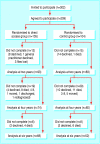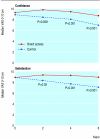Patient initiated outpatient follow up in rheumatoid arthritis: six year randomised controlled trial - PubMed (original) (raw)
Clinical Trial
Patient initiated outpatient follow up in rheumatoid arthritis: six year randomised controlled trial
Sarah Hewlett et al. BMJ. 2005.
Abstract
Objectives: To determine whether direct access to hospital review initiated by patients with rheumatoid arthritis would result in improved clinical and psychological outcome, reduced overall use of healthcare resources, and greater satisfaction with care than seen in patients receiving regular review initiated by a rheumatologist.
Design: Two year randomised controlled trial extended to six years.
Setting: Rheumatology outpatient department in teaching hospital.
Participants: 209 consecutive patients with rheumatoid arthritis for over two years; 68 (65%) in the direct access group and 52 (50%) in the control group completed the study (P = 0.04).
Clinical outcome: pain, disease activity, early morning stiffness, inflammatory indices, disability, grip strength, range of movement in joints, and bone erosion. Psychological status: anxiety, depression, helplessness, self efficacy, satisfaction, and confidence in the system. Number of visits to hospital physician and general practitioner for arthritis.
Results: Participants were well matched at baseline. After six years there was only one significant difference between the two groups for the 14 clinical outcomes measured (deterioration in range of movement in elbow was less in direct access patients). There were no significant differences between groups for median change in psychological status. Satisfaction and confidence in the system were significantly higher in the direct access group at two, four, and six years: confidence 9.8 v 8.4, 9.4 v 8.0, 8.7 v 6.9; satisfaction 9.3 v 8.3, 9.3 v 7.7, 8.9 v 7.1 (all P < 0.02). Patients in the direct access group had 38% fewer hospital appointments (median 8 v 13, P < 0.0001).
Conclusions: Over six years, patients with rheumatoid arthritis who initiated their reviews through direct access were clinically and psychologically at least as well as patients having traditional reviews initiated by a physician. They requested fewer appointments, found direct access more acceptable, and had more than a third fewer medical appointments. This radical responsive management could be tested in other chronic diseases.
Figures
Fig 1
Study flowchart
Fig 2
Patients' confidence and satisfaction in the system
Fig 3
Hospital rheumatologist appointments over six years
Similar articles
- Clinical and psychological outcome from a randomized controlled trial of patient-initiated direct-access hospital follow-up for rheumatoid arthritis extended to 4 years.
Kirwan JR, Mitchell K, Hewlett S, Hehir M, Pollock J, Memel D, Bennett B. Kirwan JR, et al. Rheumatology (Oxford). 2003 Mar;42(3):422-6. doi: 10.1093/rheumatology/keg130. Rheumatology (Oxford). 2003. PMID: 12626791 Clinical Trial. - Evaluation of a patient-initiated review system in rheumatoid arthritis: an implementation trial protocol.
Paudyal P, Perry M, Child S, Gericke CA. Paudyal P, et al. BMC Musculoskelet Disord. 2012 Jul 9;13:120. doi: 10.1186/1471-2474-13-120. BMC Musculoskelet Disord. 2012. PMID: 22776284 Free PMC article. Clinical Trial. - Shared care or nursing consultations as an alternative to rheumatologist follow-up for rheumatoid arthritis outpatients with low disease activity--patient outcomes from a 2-year, randomised controlled trial.
Primdahl J, Sørensen J, Horn HC, Petersen R, Hørslev-Petersen K. Primdahl J, et al. Ann Rheum Dis. 2014 Feb;73(2):357-64. doi: 10.1136/annrheumdis-2012-202695. Epub 2013 Feb 5. Ann Rheum Dis. 2014. PMID: 23385306 Clinical Trial. - Efficacy of patient-initiated follow-up clinics in secondary care: a systematic review.
Taneja A, Su'a B, Hill AG. Taneja A, et al. Intern Med J. 2014 Dec;44(12a):1156-60. doi: 10.1111/imj.12533. Intern Med J. 2014. PMID: 25039414 Review. - Patient Satisfaction and Costs of Multidisciplinary Models of Care in Rheumatology: a Review of the Recent Literature.
Hall J, Julia Kaal K, Lee J, Duncan R, Tsao N, Harrison M. Hall J, et al. Curr Rheumatol Rep. 2018 Mar 17;20(4):19. doi: 10.1007/s11926-018-0727-3. Curr Rheumatol Rep. 2018. PMID: 29550993 Review.
Cited by
- Self-monitoring combined with patient-initiated care in RA patients with low disease activity: cost-effectiveness analysis of an RCT.
Seppen BF, Greuter MJE, Wiegel J, Ter Wee MM, Boers M, Nurmohamed MT, Bos WH. Seppen BF, et al. Rheumatology (Oxford). 2023 Oct 3;62(10):3366-3372. doi: 10.1093/rheumatology/kead084. Rheumatology (Oxford). 2023. PMID: 36799560 Free PMC article. Clinical Trial. - Digitally-supported patient-centered asynchronous outpatient follow-up in rheumatoid arthritis - an explorative qualitative study.
Stenzel R, Hadaschik K, May S, Grahammer M, Labinsky H, Welcker M, Hornig J, Bendzuck G, Elling-Audersch C, Erstling U, Korbanka PS, Vuillerme N, Heinze M, Krönke G, Schett G, Pecher AC, Krusche M, Mucke J, Knitza J, Muehlensiepen F. Stenzel R, et al. BMC Health Serv Res. 2022 Oct 28;22(1):1297. doi: 10.1186/s12913-022-08619-6. BMC Health Serv Res. 2022. PMID: 36307779 Free PMC article. Clinical Trial. - Smartphone-Assisted Patient-Initiated Care Versus Usual Care in Patients With Rheumatoid Arthritis and Low Disease Activity: A Randomized Controlled Trial.
Seppen B, Wiegel J, Ter Wee MM, van Schaardenburg D, Roorda LD, Nurmohamed MT, Boers M, Bos WH. Seppen B, et al. Arthritis Rheumatol. 2022 Nov;74(11):1737-1745. doi: 10.1002/art.42292. Epub 2022 Sep 19. Arthritis Rheumatol. 2022. PMID: 35818342 Free PMC article. Clinical Trial. - A patient-initiated treatment model for blepharospasm and hemifacial spasm: a randomized controlled trial.
Lawes-Wickwar S, McBain H, Brini S, Hirani SP, Hurt CS, Flood C, Dunlop N, Solly D, Crampton B, Newman SP, Ezra DG. Lawes-Wickwar S, et al. BMC Neurol. 2022 Mar 17;22(1):99. doi: 10.1186/s12883-022-02603-7. BMC Neurol. 2022. PMID: 35300599 Free PMC article. Clinical Trial.
References
- Hehir M, Hewlett S, Mitchell K, Kirwan J, Memel D, Pollock J, et al. What happens in RA outpatient clinics? Rheumatology 2001;40: S146.
- Dickson DJ. What do general practitioners expect from rheumatology clinics? Br J Rheumatol 1996;35: 920. - PubMed
- Reeve H, Baxter K, Newton P, Burkey Y, Black M, Roland M. Long-term follow-up in outpatient clinics. 1: The view from general practice. Fam Pract 1997;14: 24-8. - PubMed
- Schulpen GJC, Vierhout SPM, Van Der Heijde DM, Landewe RB, Winkens RAG, Winkens AMK, et al. Patients at the outpatient rheumatology clinic: do they really need to be there? Eur J Intern Med 2003;14: 158-61. - PubMed
Publication types
MeSH terms
LinkOut - more resources
Full Text Sources
Medical


